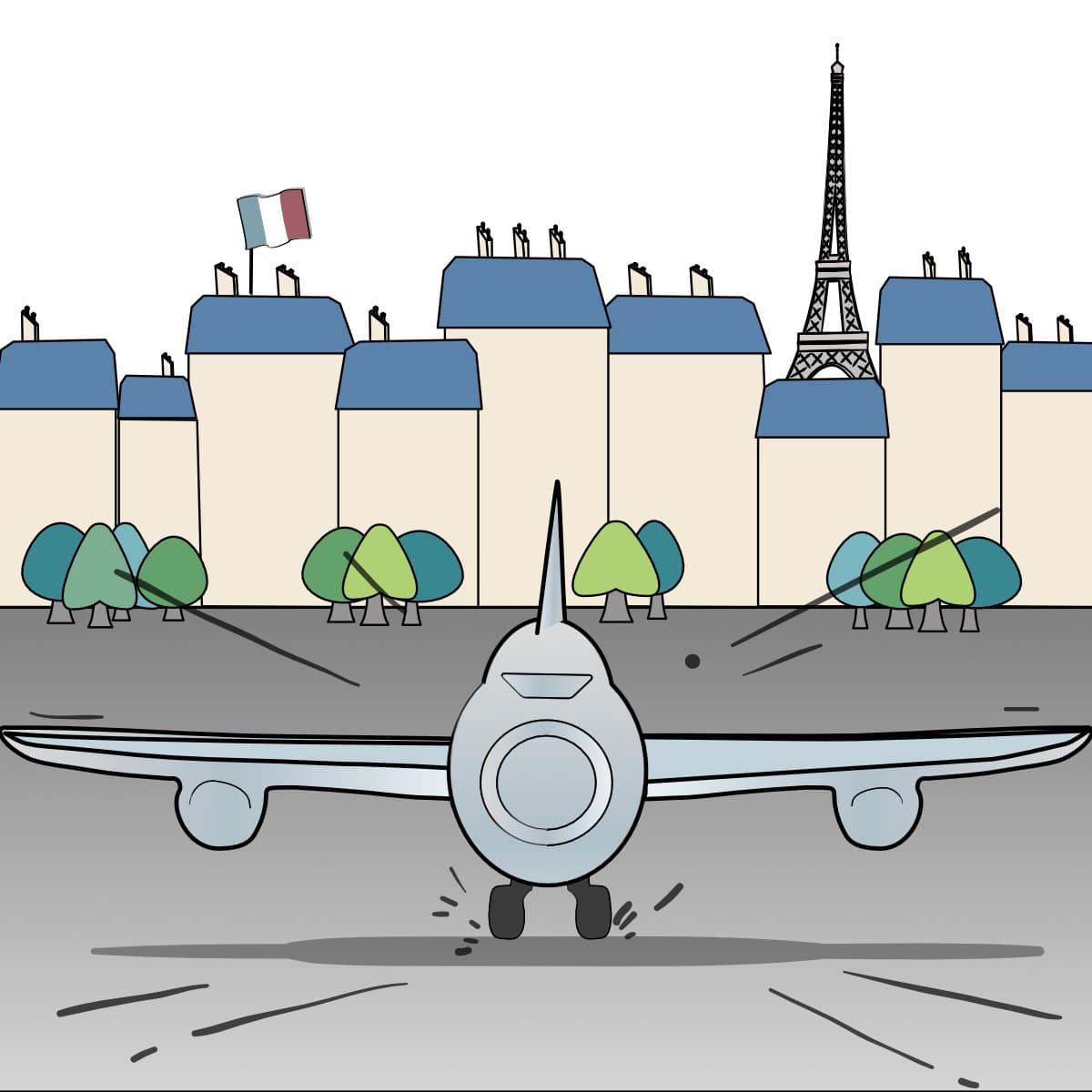Whether you’re a jet-setter or it is your first time in France, getting from airport to your accommodation in Paris after a long flight is always a bit stressful.
So here are some handy tips to navigate the trip smoothly, despite the jet-lag. Bon voyage!
Taxis
Pros:
- direct to your hotel
- help with luggage
- fixed prices for travel to central Paris
- same price as public transport if traveling in a party of 4 or more
Cons:
- more expensive than public transport
- waiting in the taxi line
Taxis are readily available outside each terminal at all of Paris’s airports. Just follow the signs in the airport to make your way to the taxi line.
While taxis offer the convenience of a direct ride to your destination, they can be more expensive than other options. However fares are fixed with, ranging from €50-70 to central Paris.
Note: There are often freelance drivers pretending to be taxi drivers waiting around the Arrivals terminal at Paris airports. These drivers are not regulated taxis and often take advantage of unsuspecting tourists. I strongly advise you to avoid them.
RER train and metro
Pros:
- much cheaper than taxis or Uber
Cons:
- RER B trains can be quite crowded
- likely have to switch trains to get to your accommodation
- no help with luggage
- can end up being more expensive if you are travelling in a party of 5 or more
Public transport around Paris is quite extensive, so if you are feeling adventurous, don’t hesitate to take the train.
CDG airport:
If you are at CDG Roissy airport, look for signs directing you to the RER B train station within the airport. You will have to purchase a ticket from the machines or counters. A single ticket to central Paris typically costs around €10.
CDG airport is the last stop on RER B, so any train you get on will head towards central Paris. Get off at your desired station in central Paris, such as Gare du Nord, Châtelet-Les Halles, or Saint-Michel Notre-Dame, and then switch to the metro in order to make your way to your hotel.
Orly airport:
The Orly airport south of Paris doesn’t yet have an RER stop directly in the airport, so you will have to take the Orlyval.Orlyval is an automatic metro that provides free travel between terminals 1-2-3 and 4 and connects the RER B at Antony station.
From Antony station, take the RER B into central Paris and then swithc to your metro to head to your hotel.
Private transfers
Pros:
- chauffeur with a sign waiting for you at Arrivals
- help with luggage
- no waiting for bus, taxi or public transport
Cons:
- slightly more expensive
For the VIP treatment, consider booking a private transfer car. There are several travel companies that offer chauffeur-driven cars to drive you from the airport directly to your accommodation in Paris.
They will have a sign with a driver waiting for you at arrival to help with luggage and guide you to the awaiting car, making the process very easy. It is slightly more expensive than a traditional taxi, but if you are more than 2 people and/or coming with a lot of luggage, this is an option that makes a lot of sense.
You can also reserve return trips from your hotel to your airport for your departure at the same time.
Airport shuttles, Roissy bus & Orly bus
Pros:
- cheaper than taxis
- signs in airport showing where to meet
Cons:
- can be expensive if you are several people travelling
- drops you at a central location in Paris, not at your hotel
If you are only staying one night in Paris, and you have booked a hotel near the airport, your hotel may have an airport shuttle. This would depend on how close your hotel is, and the time of day you arrive.
In addition, there are public transport shuttles that go from the airports into Paris.
The Roissy bus goes from Charles de Gaulle airport and Place de l’Opera in the 9th arrondissement of Paris. The Orly bus goes from Orly airport to Denfert-Rochereau in the 14th arrondissement of Paris.
Prices vary depending on the provider and your destination, but expect to pay around €12-20 per person. Once you get into Paris, you have to make your own way to your hotel.
Ride-sharing apps (Uber, Marcel)
Pros:
- cheaper than taxis
- no waiting in the taxi lines during arrival rush
Cons:
- difficult to find where to meet driver
- not authorized to drive small children without carseats
- not as highly regulated
You can also use your existing ride-sharing apps like Uber or Marcel for a more cost-effective alternative to traditional taxis. Just input your hotel destination and wait for your driver to arrive at the location indicated on the app.
I should note however, that the drivers from these apps do not often speak English, so if you don’t speak French and are not sure of where you are supposed to meet amongst the terminals, you may have a difficult time finding your driver.
Private carshare (Blablacar)
Pros:
- much cheaper than Uber or taxis
Cons:
- only for 1-2 passengers with little luggage.
- difficult to find where to meet driver
- may go to a fixed location in Paris, not your hotel
- not regulated so personal safety could be an issue
If you are a single traveler with not a lot of luggage, you can also try the Blablacar app which is private individuals providing carshare. Prices are usually much cheaper than Uber or taxis (around €5 per passenger).
Obviously this is not as regulated as a taxi or ridesharing since these are private individuals, and personal safety may be of concern.
General tips
- Timing is Key: When deciding how to travel factor in the time of the day and total travel time, especially during peak hours, as traffic can be heavy in Paris. In addition, the RER and shuttles don’t run all night long, and so may not be available.
- Currency: Ensure you have Euros on hand from an ATM at the airport, as certain foreign credit cards may not work in taxies, RER machines, etc.
- Language: While English is widely spoken in tourist areas, it’s always helpful to know a few basic French phrases so you can communicate with your driver.




